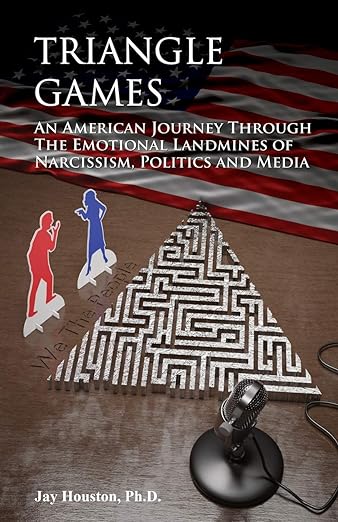

"When Narcissists have their feelings hurt by being criticized (real or perceived) especially by a respected individual, they need emotional solace, immediately. This is an attempt to have his base of followers soothe his feelings. The symbiotic relationship works in that: Trump pretends, in his acting character, to care about the issues of his base so that they can give him the precious commodity that he needs, when he needs it: Emotional Support. . .The biggest takeaway from Trump being a narcissist is that he will always choose what benefits him. Always. And only. Now if those choices happen to line up with how you see 'the issues' politically then good for you. Just know he doesn't actually share those beliefs, he just mirrors those beliefs to stay in power."
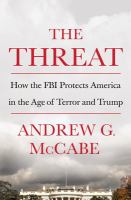

“On March 17, the FBI press office got a call from a reporter at Circa News, which owned by the right-wing media powerhouse Sinclair Broadcast Group. The reporter said that sources had told her that I had announced in staff meetings that I hated the president. Said I was out to get Michael Flynn. Said that when Flynn got fired, I slapped high fives with everyone in the room. . . There was no truth to any of this and we flatly denied it. In any normal, reasonable world, that would be end of it. . . Instead, our denial touched off a new standard cycle of story development. . . The stories may be fictional and the information false, but the consequences of this strategy are real.”
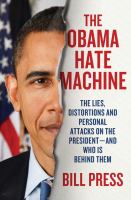

The Threat by Andrew McCabe - 2019
Triangle Games by Jay Houston, PhD. - 2020
“According to leftist activist members of the millennial generation (birth dates 1980-2000) and GenZ (birth dates post-2000), the election of Trump was psychologically scarring on order of magnitude resembling the deadliest terror attack in American history. In fact, in the immediate aftermath of Trump’s victory, countless of students at some of the most elite college campuses in the country complained that they were suffering from a kind of self-diagnosed post-traumatic stress disorder.”
Panic Attack by Robby Soave - 2019
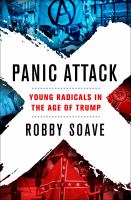

This is Not Propaganda by Peter Pomerantsev - 2019


“And if there is no future that your facts are there to prove you are achieving, then what is the appeal of facts? Why would you want facts if they tell you that your children would be poorer than you? That all versions of the future were unpromising? And why should you trust the purveyors of facts, the media and academics, think tanks, statesmen? So, the politician who makes a big show of rejecting facts, who validates the pleasure of spouting nonsense, who indulges in a full anarchic liberation from coherence, from glum reality, becomes attractive. That enough Americans could elect someone like Donald Trump with so little regard for making sense, whose many contradictory messages never add up to any stable meaning, was partly possible because enough voters felt they weren’t invested in any larger evidence-based future.”
“(Donald Trump) jumped on the Birther issue and popped on every network, charging that Obama’s parents had paid for fake newspaper ads about Barack’s birth so they could qualify for welfare.”
The Obama Hate Machine by Bill Press - 2012
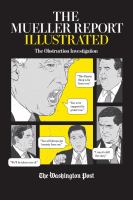

The Mueller Report Illustrated - 2019
“On Jan. 25, 2018, the New York Times broke the news that, during the previous summer, Trump had ordered White House Counsel Donald McGahn to get the Justice Department to fire special counsel Robert S. Mueller III. The Times said McGahn threatened to quit rather than follow the order. . .The news stories were a problem: They indicated that if not for the reluctance of one of his top advisors, the president would have fired the special counsel - a move that would have been seen as an attempt to impede the investigation. Publicly, the president denied he had called for Mueller’s firing. Privately, Trump began an aggressive campaign to get McGahn to dispute the reports. . . .Trump insisted that he just wanted McGahn to raise the issue of Mueller’s conflicts of interest with Deputy Attorney General Rod J. Rosenstein and let him decide what to do. McGahn said he heard it differently - that the president said: ‘Call Rod. There are conflicts. Mueller has to go. . . Will you ‘do a correction?’’ McGahn said no. Trump asked McGahn why he told the special counsel’s office about the incident. McGahn said he had no choice. He was the White House Counsel, not the president’s personal lawyer, so their conversations were not protected by attorney-client privilege, he explained. That meant when federal investigators asked McGahn about it, he was required by law to answer truthfully.”
"In his book (Bobos in Paradise: The New Upper Class and How They Got There), published in 2000, (David) Brooks illustrated elite taste by listing some prominent individuals whom he believed the Bobos (bourgeois bohemians) regarded as insufficiently intellectual to merit respect. First among those was Donald Trump. Today, many Bobos despise Trump and his supporters, and the feeling is mutual. A cosmopolitan vs. national conflict has emerged. . . the triumph of Donald Trump probably should not be viewed as a victory for purely traditional conservatism. Instead, the Trump coalition added some anti-cosmopolitan swing votes to those of traditional conservatives, even as the candidate alienated a few of the more cosmopolitan conservatives. During the election campaign, Trump made little or no use of the rhetoric of the civilization vs. barbarism axis that I claim galvanizes conservatives. In fact, many of the best-known conservative writers, such as George Will and Jonah Goldberg, were vehemently opposed to Trump. They were put off by his disrespect for the Republican Party leaders, for civil discourse, and for key conservative principles such as free trade. . , 'tribalism stripped to its essence' seems to describe all segments of American politics in the Trump era."
The Three Languages of Politics by Arnold Kling - 2019
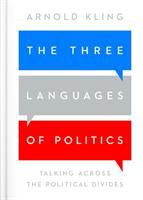

"To be sure, the GOP president spent parts of his term giving the appearance of caring about affairs of state. The former reality-show personality was mindful of how his actions might play out on Americans' television screens, which led him to occasionally script some dramas for the cameras. In June 2017, for example, Trump hosted a White House event featuring a fake signing ceremony in honor of the president's principal infrastructure goal: privatizing the nation's air-traffic control system. The gathering had all the trappings of a major bill signing ceremony - Trump even surrounded himself with Republican members of Congress, who were only too pleased to accept ceremonial pens - except the president didn't sign any legislation or executive orders. Rather he put his signature on a glorified press release the White House labeled a 'decision memo,' which is a phrase Team Trump apparently made up. In practical terms, the president organized a theatrical event in which he signed a document asking lawmakers to replace air-traffic controllers with private-sector employees. He could have just as easily published a tweet with the same appeal. Congress ignored the request. The 'decision memo' signing ceremony was theater with no purpose other than offering Trump an excuse to effectively tell the public, 'Look everyone, I'm presidenting!'"
The Impostors by Steve Benen - 2020
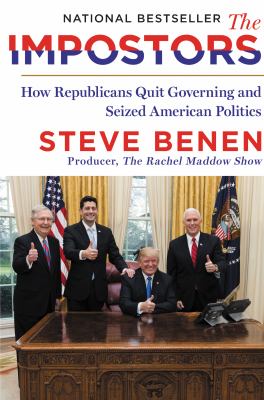

"The month after the White House speech on the Paris accord, Trump appeared at a campaign rally in Phoenix, where he spoke with great pride about part of his energy agenda. 'We've ended the war on beautiful, clean coal,' the president said. Apparently hoping to help his audience understand the policy, he added, 'They're going to take out clean coal - meaning, they're taking out coal, they're going to clean it.' The idea behind clean coal - a phrase touted by the industry since the Bush-Cheney era - is a specific technique in which coal-powered plants try to capture emissions and bury the pollution underground via pipelines. The process is often referred to as 'carbon capture and sequestration.' It does not involve anyone 'taking out coal' and then 'cleaning it.' Even when talking about policies he ostensibly likes, Trump often doesn't know what he's saying - and doesn't care to find out. The Republican embraced the idea of clean coal as a candidate, endorsing the idea during one of the general-election debates, and then incorporating the approach into his administration's energy policy. At no point, however, did it occur to Trump to learn what clean coal is. Even normal presidents can't be expected to have vast subject-matter expertise on every issue, but this president broken new ground, lacking basic familiarity with his own ideas, despite years of rhetoric on the subject. In Trump's mind, he wanted to support coal for political reasons: he thought clean sounded like a complimentary adjective, so he started referring to all coal as clean coal because it seemed like a nice thing to say. In 2018, indifferent to the industry term of art, he told reporters, 'I just left Montana, and I looked at those trains, and they're loaded up with clean coal - beautiful clean coal.' In some cases, Trump even tried to convince people that coal is unbreakable. At a campaign rally in 2018, ahead of the midterm elections, the Republican told supporters, 'We love clean, beautiful West Virginia coal. We love it. And you know that's indestructible stuff. In times of war, in times of conflict, you can blow up those windmills. They fall down really quick. You can blow up those pipelines. . . You can do a lot of things to those solar panels. But you know what you can't hurt? Coal.' As exasperated fact-checkers at the New York Times noted, 'If coal itself were truly indestructible, you couldn't mine or burn it.'"
When Words Trump Politics by Adam Hodges - 2019
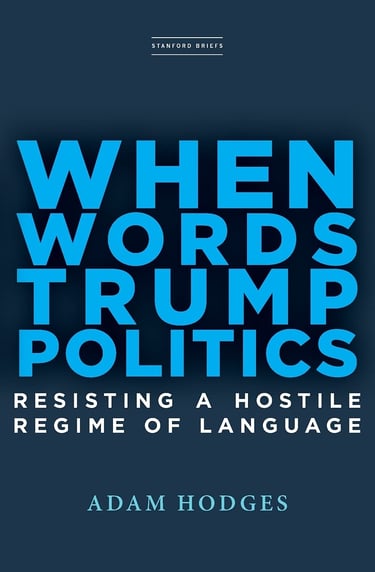

“Mikhail Bakhtin’s concept of the carnivalesque – a mocking or satirical challenge to traditional authority – provides insight into Trump’s ability to subvert dominant political conventions through humor and chaos, maximizing entertainment value as he flouts presidential norms. But this concept alone cannot do full justice to explain the ongoing, day-to-day spectacle of Trump’s presidency. To better understand the Trump phenomenon, we need to borrow a concept from the world of professional wrestling, where hyperreality converges with spectacle to produce the same strange amalgamation of bravado, hyperbole, and exaggeration (and outright lies) that marks Trumpian politics. That concept is kayfabe. Originating with carnival workers, the term kayfabe passed into the world of wrestling ‘to mean the illusion of realness’ or ‘wrestlers’ adherence to the big lie, the insistence that the unreal is real.’ Kayfabe involves a ‘willing suspension of disbelief that allows fans to buy into often fictionalized story lines, large-than-life personalities and match results.’ In other words, Nick Rogers explains, kayfabe is ‘the unspoken contract between wrestlers and spectators.’ That contract goes like this: ‘We’ll present you something clearly fake under insistence that it’s real, and you will experience genuine emotion. Neither party acknowledges the bargain, or else the magic is ruined.’ Kayfabe ensures that Trumpian political discourse is largely read through the discourse of theater as opposed to the discourse of truth, since the discourse of theater provides a lens for viewing political statements as a type of performance art. Truth and accuracy become less important that the entertainment value of words, gestures, and tweets and the emotional tone and ideological stance they carry. . . Like the drama of professional wrestling, Trumpian politics consists of continually advancing a compelling story line. The precise content of that story line matters less than the spectacle it creates. Wrestling characters include ‘faces’ (good guys) and ‘heels’ (bad guys). Matches involve ‘angles’ (scripted feuds) between the characters, and the unfolding story line contains a number of ‘swerves’ (shocking turns) to elicit ‘heat’ (crowd reactions, especially negative ones). Success in the ring is measured by the amount of heat generated, and drawn-out matches are filled with what Roland Barthes called a ‘spectacle of excess.’”
Raising Them Right by Kyle Spencer - 2022
“Trump was hardly a sophisticated campaigner, but he was good at sensing and then stoking the flames of bitterness. As the 2020 election neared, he began to make a ham-fisted argument, one that he would eventually tour the country with, and that he had shared with the Black conservative students who had shown up to the White House the previous October, during the second Young Black Leadership Summit Candace (Owens) had hosted with TPUSA. ‘Go with me, what the hell do you have to lose?’ he told the crowd of three hundred. ‘For a hundred years, African Americans have gone with the Democrats. Has it worked? Has it worked? . . . They haven’t done anything for you. They haven’t done anything.’ Campaign strategists sometimes called such efforts by Republicans to leverage Black voters’ disappointment with Democrats the ‘salt-in-the-wound strategy,’ because it rubbed in what they already believed to be true, without offering any real succor. It was a strategy Candace, too, liked to use. But for all her pontificating about how wrong-headed the left was, she was relatively silent on what modern-day Republicans had done for Black America.”
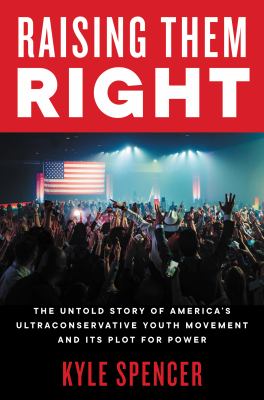

“All the same time, these handily packaged examples of an American ‘cancel culture’ gone rogue, videotaped and widely spread online, were providing excellent fuel for a conservative uprising that had started after Obama’s victory in 2008 and been reignited upon Trump’s election. Together, they created the perfect environment for near constant fearmongering among right-wing influencers, projecting a message that college kids were totally out of control and dangerous. This hysteria was exactly what young right-wing groups needed to raise money from fearful donors. And that donor money, in turn, was necessary to keep training and employing the young influencers. When Charlie Kirk told donors that college campuses had become ‘islands of intolerance,’ they believed him - and the checkbooks came out.”